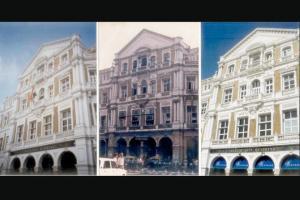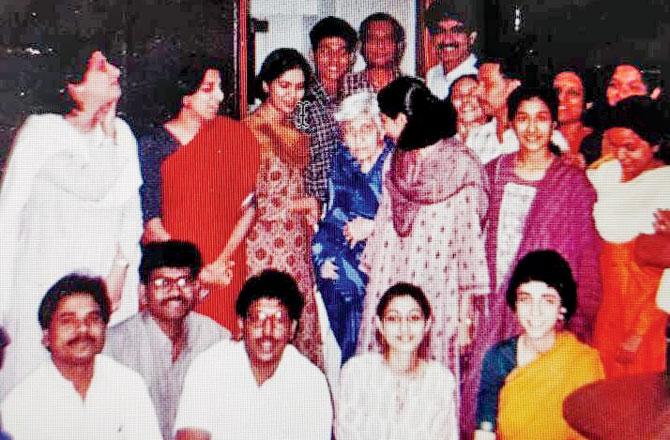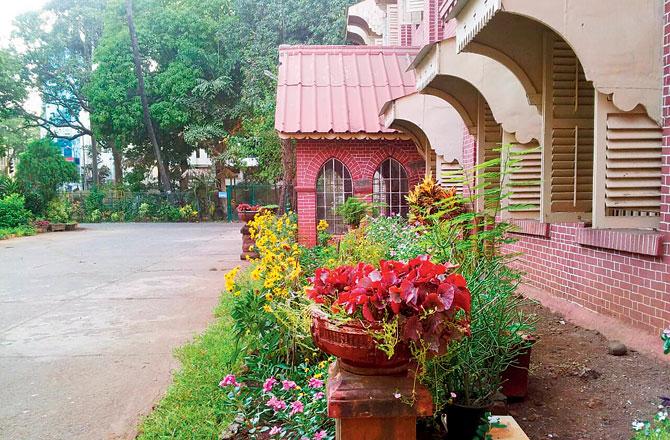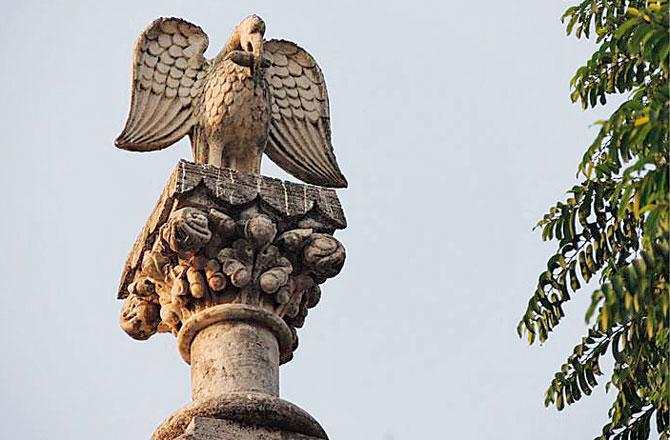Why will some heritage buildings always be special over others? Their walls whisper warmly to us

Army & Navy Building at Kala Ghoda, in its avatars before 1997 and after restoration that year by Vikas Dilawari
 I never actually left school. It follows me around comfortingly. Ad and feature films continue imaging this red brick, century-and-a half-old Bandra convent in countless shoots. While every corner and cranny held uncommon charm, I loved St Joseph's chapel best. Set in a pastoral paradise of a garden and suffused on the sultriest day with air cool as the marble font touched on entering, it almost lifted you in a soft clasp. The soothing ambience kept us from mulling over dismal marks or hopeless crushes. Of course, we used to be led here for far soberer reasons. Like praying for rain when the season seemed to bypass Bombay till August in one 1970s year.
I never actually left school. It follows me around comfortingly. Ad and feature films continue imaging this red brick, century-and-a half-old Bandra convent in countless shoots. While every corner and cranny held uncommon charm, I loved St Joseph's chapel best. Set in a pastoral paradise of a garden and suffused on the sultriest day with air cool as the marble font touched on entering, it almost lifted you in a soft clasp. The soothing ambience kept us from mulling over dismal marks or hopeless crushes. Of course, we used to be led here for far soberer reasons. Like praying for rain when the season seemed to bypass Bombay till August in one 1970s year.
St Joseph's Convent hails the Daughters of the Cross (Filles de la Croix), sent serving across the world by Mother Marie Therese. "In this Sign, thou shalt conquer... to consider others as your brothers and sisters" was their directive principle. The sign suddenly appeared in 1833 to Jeanne Haze and Virginie Sorage looking up from a Belgian courtyard. A large black Cross with a crown of ivory blazed bright in the dusk sky. Disappearing as miraculously, it left a deep impression on the friends.

Part of the mid-1990s Marg magazine team in their office in the building. Pics courtesy/Vikas Dilawari & Marg
Able to read and write prodigiously by her fourth birthday, Haze was among seven children of the secretary to the last prince-bishop of Liege. Inspired by that glowing vision, she assumed the name Sr Marie Therese and formed the Daughters of the Cross congregation. Some of its members were despatched to Bombay in 1863.
School was only the start of a journey to beautiful heritage buildings across the city.
The 1960s and '70s took me regularly to a bastion I'll always have a soft spot for. Quietly regal on a 2,365-square-yard plot bought in 1904, Bombay House lacks grand peripherals. Sans expansive lawns or a driveway, its arched entrance unfurls smack on the road without compound landscaping. Contoured by George Wittet, the 1924 building is as old as my father who spent nearly 40 years in the Tata Textiles department on the second floor.

Entrance to the red brick St Joseph's Convent, Bandra
Over sandwiches and Gold Spot (tag lined "livva little hot, sippa Gold Spot") at Marosa cafe round the corner, I met a woman responsible for much of what I do today. Sharada Dwivedi knew dad because her family firm at Dadar, GS Mhaskar & Co., was a Tata Textiles stockist. I grew to admire a buzz phrase she swore by—"Stay curious, find out". And, equally, her rigour of thought with the generosity to share it. She must still exactingly be mapping the more remarkable niches of that sprawling celestial city of the skies.
Mid Marosa chatter, dad said, "I wish you such a fine workplace someday." I did. Cutting my journo teeth in The Times of India headquarters and Army & Navy Building. But, before them came brilliant Gothic phantasmagoria. The gargoyles and quatrefoils, spires and secret passages of St Xavier's College, sculpted every inch so stunning, it's impossible to choose a few campus jewels over the rest. In those picturesque portals strode twinkle-eyed Spanish priests, men of immense learning and wisdom, including Fr Fuster and Fr Macia. Our Class of '84 batchmates, located sooner in the canteen than the iconic library, became characters of Rahul da Cunha's eponymous play. We introduced Malhar with simple spontaneity. Watching the green-yellow doodle of Puddles the Frog evolve with animated discussion, suggesting the width of the festival mascot's grin.

The eagle crowning the pediment over J.B. Petit School for Girls, Fort. Pics courtesy/Andrea Park & J.B. Petit School
Inscribed with the Latin motto, Provocans Ad Volandum—"challenged to fly"—the college crest shows a mother eagle urging her eaglets to soar. We've probably taken wing well, blessed with a legacy of luminaries like Fr Aloysius Coyne. His speech in riot-riven August 1946 rings achingly true in current climes: "In spite of differing political opinions reigning in this 'India-in-miniature,' which is our College, all of us can unite in a fundamental agreement. That love of country and readiness to sacrifice for the sake of our people are noble virtues we recognise and honour even in those from whose political ideas we may sincerely feel compelled to differ."
My personal favourite, the Army & Navy Building, has a complicated history. The original address of the first Indian Army and Navy Store, in 1891, offered affordable supplies to military personnel and civil servants stationed in India, who craved familiar items from "Home". The building was flanked by the Mechanics Institute (now David Sassoon Library) and Watson's Hotel (beleaguered Esplanade Mansion).

Cast members from Rahul da Cunha’s Class of 84, at St Xavier's College in 2003. Pic courtesyY/Rage Productions
"Previously, a building on this site housed the Bombay Municipal Corporation offices," says conservation architect Vikas Dilawari. "Dating possibly from the early 1870s, it got destroyed in a fire in 1893 and was reconstructed on the same footprint. Army & Navy Building was subsequently designed in Classical Revivalist by Gostling and Morris, specialists in that style during the later 19th century, a period preferring Neo Gothic and Indo Saracenic."
Restoring the edifice in 1997, Dilawari explains, "The high pitch and hip tiled roof, with teakwood trusses around a central rectangular void-like atrium which then was enclosed, is an interesting typology. The steel water tank rising above the roof with its cantilevered balcony is a unique feature of the building, with a walkway all round and exposed brick finish double height base. The building also surprises one with a well in the basement."

Mid-20th century view of Bombay House, Fort. Pic courtesy/Tata Central Archives
As text editor of the art magazine Marg, I worked throughout the 1990s in a third-floor southwest section of Army & Navy Building. Those were years I had my kids too. Between finetuning copy on the Qutb Shahs of Golconda and various jade traditions of the world, I did some vital tweaking of my own. My firstborn risked a feet-forward breech birth if I didn't engage in bent-over asanas, locking the tiny head correctly south. A month to delivery, this manoeuvre was recommended thrice daily.
Impossible to avoid those moves in the workday. The prospect was worrying. Odd topsy turvy poses within professional walls?
My doubts were dispelled by super lovely women colleagues excited to welcome a new arrival. Plied nonstop with supposedly strengthening food, I trooped with them in afternoon breaks to the Tata cooperative store along the rear of Esplanade Mansion. Among other goodies we bought High Range strawberry preserve, popular on all our breakfast tables.
The ladies identified a secluded alcove for my exercises, away from the central editorial hub. That careful climb to the wooden floorboard-creaking attic was rewarded by delights, inside and out. I enjoyed the sight of tender treetops atwitter with nesting koels. Crouched, contorted, poofing breaths to coax a tall foetus to turn, I eased into that atmospheric space. Inversion lent enchantment to the view. With a certain sentience, I noticed details hidden beyond obvious slanted roofing and steps to the terrace tank. Easy to miss ordinarily breezing into the attic room to meet Marg's design department there.
Anyhow, baby emerged in prescribed position. The Terrible Twos done, he toddled proudly into prep class, chuffed being told this was where his father and grandfather had been. Comprising an exquisite quartet of Gothic buildings, St Mary's School in Byculla was founded in 1864 by the Society of Jesus, after St Anne's Church adjacent to it. In blue stone covered by a corrugated iron roof, the solidly wrought oldest part of St Mary's has needed trifling repairs.
Corridors to bolt down, banisters to slide down, classrooms to bring down with bedlam, this is the perfect building for tearaway boys. Its sesquicentennial anniversary volume, Colours of Immaculate White ("Immaculata" is the school motto), quotes Azim Premji: "Our school was really cosmopolitan. It provided leadership through dedicated teachers. I carry memories of 'Baldy' who sold delicious bun pav that ran out unless you moved faster, roller skating bindaas in the hall during lunch and PT teacher Pardivala determined to fix my knock knees."
Waiting afternoons at a gate to take your little girl home can get a tad tedious. Not if it's a Venetian Gothic vision of a school building that she runs out to you from. The minutes flew as I gazed at pillars ornamented with florid motifs, way up to the enigmatic eagle perched on a pediment of the J.B. Petit High School for Girls. Owing its architecture to George Twigge Molecey and existence to a progressive Englishwoman expressly sailing to India to educate girls, J.B. Petit School was the gift of Mary Prescott in 1860. Miss Prescott's Fort Christian School, renamed the Frere Fletcher School, finally acknowledged Jehangir Bomanji Petit who extended financial aid in 1915, saving it from ceding to Cathedral Girls' School.
Children should be seen and heard. A belief of J.B.'s legendary liberal principal, Shirin Darasha, who cancelled the third word of the classic "Please do not disturb" board fronting her office. "Please do disturb", she invited instead, with embracing receptivity. Invested in the basic honesty of the young, intent that each child should have her say.
Open doors, open arms, open minds. If stones could speak, these would murmur a million stories. Endearing, enduring. Today and for all time.
Author-publisher Meher Marfatia writes fortnightly on everything that makes her love Mumbai and adore Bombay. You can reach her at meher.marfatia@mid-day.com/www.meher
marfatia.com
Keep scrolling to read more news
Catch up on all the latest Mumbai news, crime news, current affairs, and a complete guide from food to things to do and events across Mumbai. Also download the new mid-day Android and iOS apps to get latest updates.
Mid-Day is now on Telegram. Click here to join our channel (@middayinfomedialtd) and stay updated with the latest news
 Subscribe today by clicking the link and stay updated with the latest news!" Click here!
Subscribe today by clicking the link and stay updated with the latest news!" Click here!









